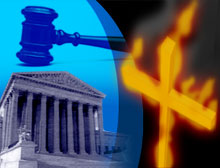January 23, 2004
 |
But it struck down a provision of the law which declared that any cross burning
is on its face evidence of intimidation.
The closely divided court rejected arguments that the practice of burning crosses
is a constitutional form of free speech.
The 5-4 decision written by Justice Sandra Day O'Connor splintered both the
more liberal and conservative wings of the Supreme Court.
O'Connor was joined by Chief Justice William Rehnquist and Associate Justices
Antonin Scalia, John Paul Stevens and Stephen Breyer in key portions of the
ruling.
"We conclude that while a state consistent with the First Amendment may
ban cross burning carried out with the intent to intimidate, the provision in
the Virginia statute treating any cross burning as prima facie evidence of intent
to intimidate renders the statute unconstitutional," the ruling said.
In dissent, the court's only African-American justice, Clarence Thomas, said
he agreed with the majority that states may ban cross burnings, but disagreed
they could ever represent free speech.
Thomas said cross burning already constitutes an illegal act of intimidation,
and therefore does not need to be seen as a test of free speech.
"This statute prohibits only conduct, not expression," Thomas said.
"Just as one cannot burn down someone's house to make a political point
and then seek refuge in the First Amendment, those who hate cannot terrorize
and intimidate to make their point," he said.
The Ku Klux Klan and its sympathizers, during what Thomas described as "a
reign of terror," for decades set crosses ablaze in ceremonies.
Fourteen states and the District of Columbia have passed statutes that prohibit
cross burning.
Find this article at:
http://www.cnn.com/2003/LAW/04/07/scotus.cross.burning